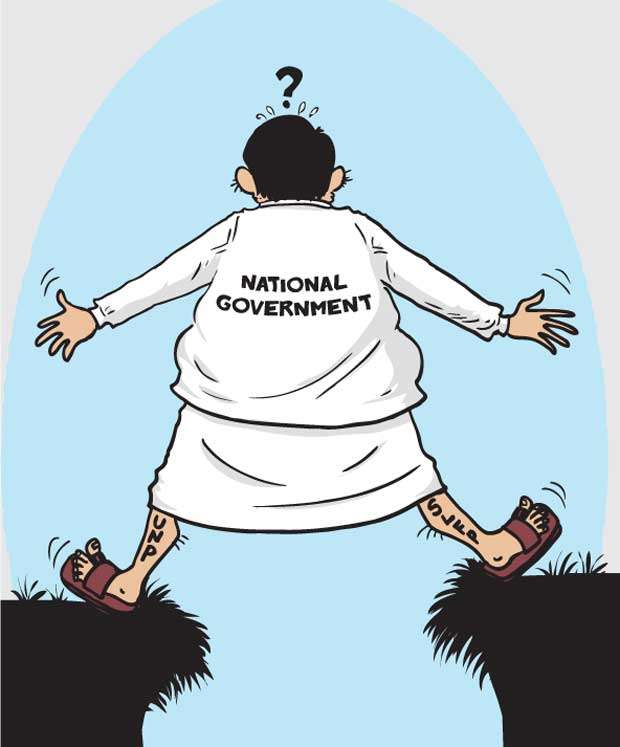A Brief Colonial History Of Ceylon(SriLanka)
Sri Lanka: One Island Two Nations
A Brief Colonial History Of Ceylon(SriLanka)
Sri Lanka: One Island Two Nations
(Full Story)
Search This Blog
Back to 500BC.
==========================
Thiranjala Weerasinghe sj.- One Island Two Nations
?????????????????????????????????????????????????Tuesday, April 17, 2018
People trapped in a quagmire amid raging political struggle

2018-04-17

 he
reason behind last Thursday’s surprise move by President Maithripala
Sirisena to prorogue the Parliament was clear. He is in a Catch-22
situation in the wake of his party members being compelled to resign
from the portfolios they held in the government after they supported the
joint opposition sponsored no-confidence motion against Prime Minister
Ranil Wickremesinghe. The President now appears to be trying to buy time
by proroguing Parliament to decide on his next move in his struggle to
survive.
he
reason behind last Thursday’s surprise move by President Maithripala
Sirisena to prorogue the Parliament was clear. He is in a Catch-22
situation in the wake of his party members being compelled to resign
from the portfolios they held in the government after they supported the
joint opposition sponsored no-confidence motion against Prime Minister
Ranil Wickremesinghe. The President now appears to be trying to buy time
by proroguing Parliament to decide on his next move in his struggle to
survive. He wanted to remove the Prime Minister from his post after the recent local council elections whereas now the Prime Minister’s party, the United National Party (UNP) after the defeat of the no-confidence motion has taken steps to hit back by splitting his party and isolating him. The Sri Lanka Podujana Peramuna (SLPP) which is unofficially led by former president Mahinda Rajapaksa winning a majority of local councils, some parliamentarians of the Sri Lanka Freedom Party (SLFP) led by the President are seemingly looking for opportunities to desert him and team up with the former president.
Fifteen out of 16 members of the President-led SLFP who had voted in favour of the no-confidence motion against the Prime Minister resigned from their posts last week and the other member, Deputy Speaker Thilanga Sumathipala is also said to have submitted his resignation to the Speaker Karu Jayasuriya. S.B. Dissanayake, who was one of the ministers who resigned had publicly told over the weekend that they would sit with the opposition once Parliament is re-convened.
The President’s position in the government is now on slippery ground apart from the fact that the UNP-led government has also been drastically weakened after the local government elections and the no-confidence motion against the Premier. The defeat of the motion was a temporary setback for the Rajapaksa faction or the JO but it was soon offset by the conflicts between the two main parties in the government and within the SLFP. Therefore, not only President Sirisena but also the UNP-led government is in a Catch-22 situation and it is against such a backdrop that the President has prorogued Parliament.
In spite of the present government being a coalition government between the UNP and the SLFP, the two parties remain in government without any mutual understanding. Despite it being officially called a National Government it does not look at the things from a national point of view. The two parties do not have any common policy or any common economic programme. In fact they do not have any economic programme whatsoever, leave alone a common programme. All three main political parties, the UNP, the SLFP and the SLPP have totally forgotten the people of the country because their total concentration is on the power struggle among them while in fact the country has moved beyond the state of instability and on the verge of reaching the state of anarchy.
People are unaware as to who administers the country or at least whether there is a government in the country. The once powerful executive presidency has been humbled both by its so-called coalition partner as well as the unofficial opposition which is the real opposition for all practical purposes. Both the President and the Prime Minister cannot run the affairs of the government on their own while they are at odds with everything else.
There cannot be a way out without the change of the current composition of Parliament. Given the differences between the political parties in the current Parliament, a meaningful new coalition to run the government for the remaining period of the tenure of this Parliament seems to be out of the question. Yet, the President is not empowered to dissolve Parliament until it completes a period of four and a half years from the date of its first meeting, according to the 19th Amendment to the Constitution. Despite there being provisions in Constitution to dissolve Parliament on a request made by Parliament, it is doubtful such a move would ever materialize. Hence, there must be a way out for the people who are at the receiving end to compel the leaders to come to an agreement to end the current impasse.

